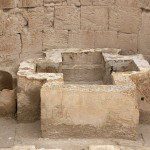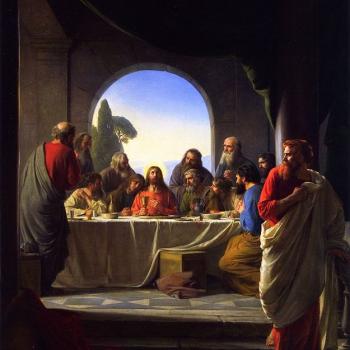![Jacob Blessing Ephraim and Manasseh *oil on canvas *173 x 209 cm *signed b.l.: Rembran[dt] / f. 1656](https://wp-media.patheos.com/blogs/sites/572/2017/01/JacobBlessing.jpg)
Jacob Blessing Ephraim and Manasseh (1656), by Rembrandt (1606-1669) [public domain / Wikimedia Commons]
***
(3-8-06)
***
Genesis 18:19 (NIV) For I have chosen him, so that he will direct his children and his household after him to keep the way of the Lord by doing what is right and just, . . .
Grammatically and linguistically, “Children” and “household” are distinct, however, conceptually or logically, I think this shows that the two are present together, and not incompatible at all.
The Hebrew bayith (Strong’s word #1004) indeed has a wide range of application, akin to adelphos (lit., “brother”), which is key to the disputes over Mary’s perpetual virginity. So we must look at context and consult lexicons and commentaries. Gesenius’ Hebrew-Chaldee Lexicon to the Old Testament, p. 116, section 8 for this word, states that the word bayith in Gen 18:19 means “those sprung from any family, descendants, offspring, progeny.”
I don’t see any bias against children or infants in that definition. It’s not airtight, but on the other hand, to exclude children from it strikes me as arbitrary and unfounded. Children were already part of the covenant. The New Bible Dictionary (ed. J. D. Douglas, Grand Rapids, Michigan: Eerdmans, 1962), in its article on “Covenant” (pp. 264-265) makes this clear:
[the Noahic covenant: Gen 9:9-17] is universal in its scope; it embraces not only Noah but his seed after him and every living creature. The scope demonstrates that the grace bestowed is not dependent upon intelligent understanding or favourable response on the part of the beneficiaries.
As for the Abrahamic covenant:
The sign of the covenant is circumcision . . . seal of the covenant in the highest reaches of its spirituality; it is even called the covenant (Gen 17:10). Circumcision signifies the purification (cf. Ex 6:12, 30, Lv 19:23, 26:41, Dt 10:16, 30:6, Jer 4:4, 6:10, 9:25) indispensable to that communion with God which is the central blessing of the covenant (Gen 17:7).
St. Paul makes the analogy of circumcision as the seal of the Old Covenant and entrance into the House of Israel to baptism as the new seal, and entrance into the new covenant and the Church (Col 2:9-14; 3:1-4, 17 – “God’s chosen people” – NIV). To my mind, children (including infants) are definitely in view in all these passages and concepts. As a purely linguistic matter, I hope God could say of me:
Dave will direct his children and his household after him to keep the way of the Lord by doing what is right and just, . . .
The thrust of the passage is towards the future. My own household includes four children: the youngest now being 11 months old. And who says this “directing” is all verbal and conceptual in the first place? I submit that even a newborn is already being directed in the ways of God, by example. One loves a baby (as opposed to abusing or neglecting it), and this might be seen as a form of “directing.”
Furthermore, we find the following passage (NIV):
Genesis 17:23, 27 . . . Abraham took his son Ishmael and all those born in his household . . . . and circumcised them . . . every male in Abraham’s household, including those born in his household or bought from a foreigner, was circumcised with him.
Are we to somehow conclude that those “born in a household” are not part of that household (and of the covenant)? No. And in the accounts of baptisms of households in Acts, the application is clearly to a family (possibly nuclear but probably extended, in accordance with ancient Jewish culture). Thus the meaning is clear in context: Cornelius’ household is baptized (Acts 10:24,47-48). This included “friends” as well as “relatives.” I see no reason to exclude a priori, infants or children. Likewise, with Lydia (Acts 16:15). It’s fine and dandy to note a wider application of the notion “household” but that doesn’t prove that the wider scope prevails in every instance. Only context and cross-referencing can determine the interpretation of a given passage.
Greek linguist Gerhard Kittel informs us that the cognate oikia sometimes refers to “family” (Mt 10:12, 12:25). and notes the use of oikos in the same sense (1 Cor 1:16, Phlm 2, Acts 5:42, 11:14 [Cornelius’ house], 16:15 [Lydia’s house, also seen above], 16:31,34, probably Acts 18:18, Acts 20:20, 1 Tim 3:4,12, 2 Tim 1:16, Titus 1:11); as well as similar use in St. Ignatius’ Letter to the Smyrneans (13:10) and in Polycarp (8:2).
Genesis 31:41 It was like this for the twenty years I was in your household. I worked for you fourteen years for your two daughters . . .
Since the covenant included circumcised infants, their inclusion in the description “children” is, I think, implied. If “daughters” are implied as part of a household here (the notion of which is self-evident, so I would argue), then I don’t see that infant daughters would necessarily be excluded (if they happened to be present). The burden of proof lies on those who believe in adult baptism only, to show that the exclusion of infants is plausible at all.
Genesis 36:6 Esau took his wives and sons and daughters and all the members of his household, . . . .
Baptism of infants is entirely consistent with Paul’s analogy to circumcision, and the biblical understanding of covenant as extended to children (which all Christians, who don’t think that all unbaptized children or those under the age of reason, or severely retarded, etc., who die, go to hell, accept). The larger task is to synthesize all the biblical data we have with regard to baptism. When we do that, though we readily concede that the passages about “households” don’t prove infant baptism; yet they are entirely consistent with it. And that is why the vast majority of Christians all through the ages (including a sizable majority of Protestants) have practiced it. The nature of sacramentalism, also, suggests it.
No one has ever proven that no infants are ever included. Why don’t those who deny infant baptism come up with a passage expressly teaching their view? And furthermore, if Paul and other New Testament writers believed in adult baptism, why didn’t they come right out and explicitly say that? It would be simple enough. But no such verse can be found.
Unless one believes that all infants under the age of reason, or adults who are severely retarded, brain-damaged, comatose, or who have never ever heard the gospel, etc. (the “hard cases”) are going to hell, then one is already accepting some form of inclusion into salvation and the covenant apart from mental assent and willful decision. One has to either assert that these people automatically go to hell (in effect, predestined to go there, since they have little or no free will), and try to defend that notion, or qualify one’s understanding of what it means to be saved (or baptized, to bring it back to the present discussion).
In Catholic theology, we allow for the baptism of desire in exceptional cases where the sacrament cannot be had (e.g., in the minute before a non-baptized person succumbs to injuries from a fatal car crash). That doesn’t mean that people who can be baptized and know that they are commanded to do so are let “off the hook.” Exceptional cases do not disprove the rule. As C. S. Lewis said: “the rules of chess create chess problems.” Baptism is a command, and it is a sacrament which regenerates the person who receives it. Baptism is necessary because original sin is universal, since the Fall.













